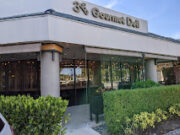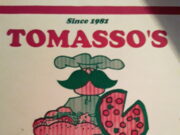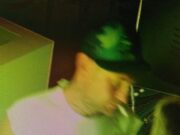
Deerfield-News.com-Deerfield BeachFl- Happy Passover! Chag Sameach! This a version Oysher’s Chad Gadyu sung by Cantor Shulem Lemmer maybe the greatest living Cantor in the US, even the Late Great Moishe Oysher would be proud this young man keeping both Yiddish and Hebrew songs alive.
Translations-Wikipedia.org
Lyrics[edit]
| English ONE LITTLE GOAT |
Transcription of Hebrew Reading Chad Gadya |
Transliteration of Aramaic ħad gadyā |
Aramaic חַד גַּדְיָא |
|
|---|---|---|---|---|
| Verse 1: | ||||
| One little goat, one little goat: | Chad gadya, chad gadya, | ħaḏ gaḏyā, ħaḏ gaḏyā, | חַד גַּדְיָא, חַד גַּדְיָא | |
| Which my father bought for two zuzim. | dizabin abah bitrei zuzei. | dəzabbīn abbā biṯrē zūzē. | דְּזַבִּין אַבָּא בִּתְרֵי זוּזֵי | |
| Verse 2: | ||||
| One little goat, one little goat: | Chad gadya, chad gadya, | ħaḏ gaḏyā, ħaḏ gaḏyā, | חַד גַּדְיָא, חַד גַּדְיָא | |
| The cat came, and ate the goat, | ve-ata shunra ve-akhlah le-gadya | wəʔāṯā šūnrā wəʔāḵlā ləgaḏyā | וְאָתָא שׁוּנְרָא, וְאָכְלָה לְגַדְיָא | |
| Which my father bought for two zuzim. | dizabin abba bitrei zuzei. | dəzabbīn abbā biṯrē zūzē. | דְּזַבִּין אַבָּא בִּתְרֵי זוּזֵי | |
| Verse 3: | ||||
| One little goat, one little goat: | Chad gadya, chad gadya, | ħaḏ gaḏyā, ħaḏ gaḏyā, | חַד גַּדְיָא, חַד גַּדְיָא | |
| The dog came, and bit the cat, that ate the goat, | ve-ata kalba ve-nashakh le-shunra, de-akhlah le-gadya | wəʔāṯā ḵalbā wənāšaḵ ləšūnrā, dəʔāḵlā ləgaḏyā | וְאָתָא כַלְבָּא ,וְנָשַׁךְ לְשׁוּנְרָא, דְּאָכְלָה לְגַדְיָא | |
| Which my father bought for two zuzim. | dizabin abba bitrei zuzei. | dəzabbīn abbā biṯrē zūzē. | דְּזַבִּין אַבָּא בִּתְרֵי זוּזֵי | |
| Verse 4: | ||||
| One little goat, one little goat: | Chad gadya, chad gadya, | ħaḏ gaḏyā, ħaḏ gaḏyā, | חַד גַּדְיָא, חַד גַּדְיָא | |
| The stick came, and beat the dog, | ve-ata chutra, ve-hikkah le-khalba | wəʔāṯā ħūṭrā, wəhikkā ləḵalbā | וְאָתָא חוּטְרָא, וְהִכָּה לְכַלְבָּא | |
| that bit the cat, that ate the goat, | de-nashakh le-shunra, de-akhlah le-gadya | dənāšaḵ ləšūnrā, dəʔāḵlā ləgāḏyā | דְּנָשַׁךְ לְשׁוּנְרָא, דְּאָכְלָה לְגַדְיָא | |
| Which my father bought for two zuzim. | dizabin abba bitrei zuzei. | dəzabbīn abbā biṯrē zūzē. | דְּזַבִּין אַבָּא בִּתְרֵי זוּזֵי | |
| Verse 5: | ||||
| One little goat, one little goat: | Chad gadya, chad gadya, | ħaḏ gaḏyā, ħaḏ gaḏyā, | חַד גַּדְיָא, חַד גַּדְיָא | |
| The fire came, and burned the stick, | ve-ata nura, ve-saraf le-chutra | wəʔāṯā nūrā, wəśārap̄ ləħūṭrā | וְאָתָא נוּרָא, וְשָׂרַף לְחוּטְרָא | |
| that beat the dog, that bit the cat, that ate the goat, | de-hikkah le-khalba, de-nashakh le-shunra, de-akhlah le-gadya | dəhikkā ləḵalbā, dənāšaḵ ləšūnrā, dəʔāḵlā ləgāḏyā | דְּהִכָּה לְכַלְבָּא ,דְּנָשַׁךְ לְשׁוּנְרָא, דְּאָכְלָה לְגַדְיָא | |
| Which my father bought for two zuzim. | dizabin abba bitrei zuzei. | dəzabbīn abbā biṯrē zūzē. | דְּזַבִּין אַבָּא בִּתְרֵי זוּזֵי | |
| Verse 6: | ||||
| One little goat, one little goat: | Chad gadya, chad gadya, | ħaḏ gaḏyā, ħaḏ gaḏyā, | חַד גַּדְיָא, חַד גַּדְיָא | |
| The water came, and put out the fire, | ve-ata maya, ve-khavah le-nura | wəʔāṯā mayyā, wəḵāḇā lənūrā | וְאָתָא מַיָּא, וְכָבָה לְנוּרָא | |
| that burned the stick, that beat the dog, | de-saraf le-chutra, de-hikkah le-khalba | dəšārap̄ ləħūṭrā, dəħikkā ləḵalbā | דְּשָׂרַף לְחוּטְרָא ,דְּהִכָּה לְכַלְבָּא | |
| that bit the cat, that ate the goat, | de-nashakh le-shunra, de-akhlah le-gadya | dənāšaḵ ləšūnrā, dəʔāḵlā ləgāḏyā | דְּנָשַׁךְ לְשׁוּנְרָא, דְּאָכְלָה לְגַדְיָא | |
| Which my father bought for two zuzim. | dizabin abba bitrei zuzei. | dəzabbīn abbā biṯrē zūzē. | דְּזַבִּין אַבָּא בִּתְרֵי זוּזֵי | |
| Verse 7: | ||||
| One little goat, one little goat: | Chad gadya, chad gadya, | ħaḏ gaḏyā, ħaḏ gaḏyā, | חַד גַּדְיָא, חַד גַּדְיָא | |
| The ox came, and drank the water, | ve-ata tora, ve-shatah le-maya | wəʔāṯā tōrā, wəšāṯā ləmayyā | וְאָתָא תוֹרָא, וְשָׁתָה לְמַיָּא | |
| that put out the fire, that burned the stick, | de-khavah le-nura, de-saraf le-chutra | dəḵāḇā lənūrā, dəšārap̄ ləħūṭrā | דְּכָבָה לְנוּרָא ,דְּשָׂרַף לְחוּטְרָא | |
| that beat the dog, that bit the cat, that ate the goat, | de-hikkah le-khalba, de-nashakh le-shunra, de-akhlah le-gadya | dəhikkā ləḵalbā, dənāšaḵ ləšūnrā, dəʔāḵlā ləgāḏyā | ּ דהִכָּה לְכַלְבָּא, דְּנָשַׁךְ לְשׁוּנְרָא, דְּאָכְלָה לְגַדְיָא | |
| Which my father bought for two zuzim. | dizabin abba bitrei zuzei. | dəzabbīn abbā biṯrē zūzē. | דְּזַבִּין אַבָּא בִּתְרֵי זוּזֵי | |
| Verse 8: | ||||
| One little goat, one little goat: | Chad gadya, chad gadya, | ħaḏ gaḏyā, ħaḏ gaḏyā, | חַד גַּדְיָא, חַד גַּדְיָא | |
| The slaughterer (Shohet) came, and killed the ox, | ve-ata ha-shochet, ve-shachat le-tora | wəʔāṯā hašōħēṭ, wəšāħaṯ ləṯōrā | וְאָתָא הַשּׁוֹחֵט, וְשָׁחַט לְתוֹרָא | |
| that drank the water, that put out the fire, | de-shatah le-maya, de-khavah le-nura | dəšāṯā ləmayyā, dəḵāḇā lənūrā | דְּשָׁתָה לְמַיָּא ,דְּכָבָה לְנוּרָא | |
| that burned the stick, that beat the dog, | de-saraf le-chutra, de-hikkah le-khalba | dəšārap̄ ləħūṭrā, dəhikkā ləḵalbā | דְּשָׂרַף לְחוּטְרָא, דְּהִכָּה לְכַלְבָּא | |
| that bit the cat, that ate the goat, | de-nashakh le-shunra, de-akhlah le-gadya | dənāšaḵ ləšūnrā, dəʔāḵlā ləgāḏyā | דְּנָשַׁךְ לְשׁוּנְרָא, דְּאָכְלָה לְגַדְיָא | |
| Which my father bought for two zuzim. | dizabin abba bitrei zuzei. | dəzabbīn abbā biṯrē zūzē. | דְּזַבִּין אַבָּא בִּתְרֵי זוּזֵי | |
| Verse 9: | ||||
| One little goat, one little goat: | Chad gadya, chad gadya, | ħaḏ gaḏyā, ħaḏ gaḏyā, | חַד גַּדְיָא, חַד גַּדְיָא | |
| The angel of death came, and slew the slaughterer, | ve-ata mal’akh ha-mavet, ve-shachat le-shochet | wəʔāṯā malʔaḵ hammāweṯ, wəšāħaṭ ləšōħēṭ | וְאָתָא מַלְאַךְ הַמָּוֶת, וְשָׁחַט לְשׁוֹחֵט | |
| who killed the ox, that drank the water, | de-shachat le-tora, de-shatah le-maya | dəšāħaṭ ləṯōrā, dəšāṯā ləmayyā | דְּשָׁחַט לְתוֹרָא, דְּשָׁתָה לְמַיָּא | |
| that put out the fire, that burned the stick, | de-khavah le-nura, de-saraf le-chutra | dəḵāḇā lənūrā, dəšārap̄ ləħūṭrā | דְּכָבָה לְנוּרָא, דְּשָׂרַף לְחוּטְרָא | |
| that beat the dog, that bit the cat, that ate the goat, | de hikkah le-khalba, de-nashakh le-shunra, de-akhlah le-gadya | dəhikkā ləḵalbā, dənāšaḵ ləšūnrā, dəʔāḵlā ləgāḏyā | דְּהִכָּה לְכַלְבָּא, דְּנָשַׁךְ לְשׁוּנְרָא, דְּאָכְלָה לְגַדְיָא | |
| Which my father bought for two zuzim. | dizabin abba bitrei zuzei. | dəzabbīn abbā biṯrē zūzē. | דְּזַבִּין אַבָּא בִּתְרֵי זוּזֵי | |
| Verse 10: | ||||
| One little goat, one little goat: | Chad gadya, chad gadya, | ħaḏ gaḏyā, ħaḏ gaḏyā, | חַד גַּדְיָא, חַד גַּדְיָא | |
| Then came The Holy One, Blessed be He, | ve-ata ha-Kadosh Baruch Hu | wəʔāṯā haqqadōš bārūḵ hū | וְאָתָא הַקָּדוֹשׁ בָּרוּךְ הוּא | |
| and smote the angel of death, who slew the slaughterer, | ve-shachat le-mal’akh ha-mavet, de-shachat le-shochet | wəšāħaṭ ləmalʔaḵ hammāweṯ, dəšāħaṭ ləšōħēṭ | וְשָׁחַט לְמַלְאַךְ הַמָּוֶת ,דְּשָׁחַט לְשׁוֹחֵט | |
| who killed the ox, that drank the water, | de-shachat le-tora, de-shatah le-maya | dəšāħaṭ ləṯōrā, dəšāṯā ləmayyā | דְּשָׁחַט לְתוֹרָא, דְּשָׁתָה לְמַיָּא | |
| that put out the fire, that burned the stick, | de-khavah le-nura, de-saraf le-chutra | dəḵāḇā lənūrā, dəšārap̄ ləħūṭrā | דְּכָבָה לְנוּרָא, דְּשָׂרַף לְחוּטְרָא | |
| that beat the dog, that bit the cat, that ate the goat, | de-hikkah le-khalba, de-nashakh le-shunra, de-akhlah le-gadya | dəhikkā ləḵalbā, dənāšaḵ ləšūnrā, dəʔāḵlā ləgāḏyā | דְּהִכָּה לְכַלְבָּא ,דְּנָשַׁךְ לְשׁוּנְרָא, דְּאָכְלָה לְגַדְיָא | |
| Which my father bought for two zuzim. | dizabin abba bitrei zuzei. | dəzabbīn abbā biṯrē zūzē. | דְּזַבִּין אַבָּא בִּתְרֵי זוּזֵי | |
| Verse 11: | ||||
| One little goat, one little goat. | Chad gadya, chad gadya, | ħaḏ gaḏyā, ħaḏ gaḏyā, | חַד גַּדְיָא, חַד גַּדְיָא | |
Symbolism[edit]
Chad Gadya, Sung by Yosef Elbaz, Jerusalem 19 April 1973. Sung in Aramaic and in Moroccan Arabic.
As with any work of verse, Chad Gadya is open to interpretation. According to some modern Jewish commentators, what appears to be a light-hearted song may be symbolic. One interpretation is that Chad Gadya is about the different nations that have conquered the Land of Israel: The kid symbolizes the Jewish people, the cat, Assyria; the dog, Babylon; the stick, Persia; the fire, Macedonia; the water, Roman Empire; the ox, the Saracens; the slaughterer, the Crusaders; the angel of death, the Turks. At the end, God returns to send the Jews back to Israel. The recurring refrain of ‘two zuzim’ is a reference to the two stone tablets given to Moses on Mount Sinai (or refer to Moses and Aaron). Apparently this interpretation was first widely published in pamphlet published in 1731 in Leipzig by Philip Nicodemus Lebrecht.[5] This interpretation has become quite popular, with many variations of which oppressor is represented by which character in the song.[6]
Though commonly interpreted as an historical allegory of the Jewish people, the song may also represent the journey to self-development. The price of two zuzim, mentioned in every stanza, is (according to the Targum Jonathan to First Samuel 9:8) equal to the half-shekel tax upon every adult Israelite male (in Exodus 30:13); making the price of two zuzim the price of a Jewish soul. In an article first published in the Journal of Jewish Music & Liturgy in 1994, Rabbi Kenneth Brander, the co-author of The Yeshiva University Haggadah, summarized the interpretations of three rabbis: (1) Rabbi Jacob Emden in 1975, as a list of the pitfalls and perils facing the soul during one’s life. (2) Rabbi Jonathan Eybeschuetz (1690-1764) as a very abbreviated history of Israel from the Covenant of the Two Pieces recorded in Genesis 15 (the two zuzim), to slavery in Egypt (the cat), the staff of Moses (the stick) and ending with the Roman conqueror Titus (the Angel of Death). And (3) from Rabbi Moses Sofer, the Hatim Sofer (1762-1839), in which the song described the Passover ritual in the Temple of Jerusalem – the goat purchased for the Paschal sacrifice, according to the Talmud dreaming of a cat is a premonition of singing such as occurs in the seder, the Talmud also relates that dogs bark after midnight which is the time limit for the seder, the priest who led the cleaning of the altar on Passover morning would use water to wash his hands, many people at the Temple that day would bring oxen as sacrifices, the Angel of Death is the Roman Empire that destroyed the Second Temple, etc.[7]



































